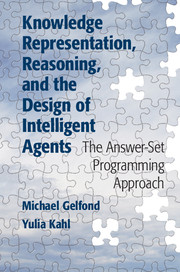 Knowledge Representation, Reasoning, and the Design of Intelligent Agents
Knowledge Representation, Reasoning, and the Design of Intelligent Agents Book contents
- Frontmatter
- Dedication
- Contents
- Preface
- 1 Logic-Based Approach to Agent Design
- 2 Answer Set Prolog (ASP)
- 3 Roots of Answer Set Prolog
- 4 Creating a Knowledge Base
- 5 Representing Defaults
- 6 The Answer-Set Programming Paradigm
- 7 Algorithms for Computing Answer Sets
- 8 Modeling Dynamic Domains
- 9 Planning Agents
- 10 Diagnostic Agents
- 11 Probabilistic Reasoning
- 12 The Prolog Programming Language
- Appendix A ASP Solver Quick-Start
- Appendix B Aspide
- Appendix C Introduction to SPARC
- Appendix D Code
- Bibliography
- Index
10 - Diagnostic Agents
Published online by Cambridge University Press: 05 July 2014
- Frontmatter
- Dedication
- Contents
- Preface
- 1 Logic-Based Approach to Agent Design
- 2 Answer Set Prolog (ASP)
- 3 Roots of Answer Set Prolog
- 4 Creating a Knowledge Base
- 5 Representing Defaults
- 6 The Answer-Set Programming Paradigm
- 7 Algorithms for Computing Answer Sets
- 8 Modeling Dynamic Domains
- 9 Planning Agents
- 10 Diagnostic Agents
- 11 Probabilistic Reasoning
- 12 The Prolog Programming Language
- Appendix A ASP Solver Quick-Start
- Appendix B Aspide
- Appendix C Introduction to SPARC
- Appendix D Code
- Bibliography
- Index
Summary
In this chapter we discuss how to build agents capable of finding explanations of unexpected observations. To do that we divide actions of our domain into two disjoint classes: agent actions and exogenous actions. As expected the former are those performed by the agent associated with the domain, and the latter are those performed by nature or by other agents. As usual we make two simplifying assumptions:
The agent is capable of making correct observations, performing actions, and recording these observations and actions.
Normally the agent is capable of observing all relevant exogenous actions occurring in its environment.
Note that the second assumption is defeasible — some exogenous actions can remain unobserved. These assumptions hold in many realistic domains and are suitable for a broad class of applications. In other domains, however, the effects of actions and the truth-values of observations can only be known with a substantial degree of uncertainty, which cannot be ignored in the modeling process. We comment on such situations in Chapter 11, which deals with probabilistic reasoning.
In our setting a typical diagnostic problem is informally specified as follows:
• A symptom consists of a recorded history of the system such that its last collection of observations is unexpected (i.e., it contradicts the agent's expectations).
• An explanation of a symptom is a collection of unobserved past occurences of exogenous actions that may account for the unexpected observations.
This notion of explanation is closely connected with our second simplifying assumption.
Information
- Type
- Chapter
- Information
- Knowledge Representation, Reasoning, and the Design of Intelligent AgentsThe Answer-Set Programming Approach, pp. 216 - 234Publisher: Cambridge University PressPrint publication year: 2014